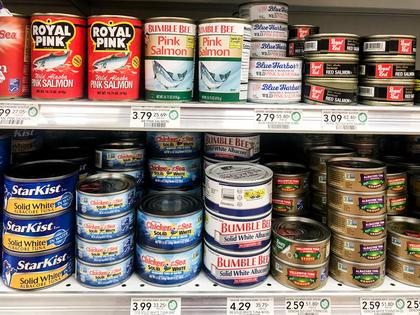5 foods with more calcium than a glass of milk
Published in Health & Fitness
When it comes to calcium, the first food that probably comes to mind is cow’s milk. Undoubtedly, cow’s milk is an excellent source of calcium, with 1 cup (8 fluid ounces) providing 309 milligrams, or 24% of your daily value. Calcium is vital for building and maintaining healthy bones and teeth and ensuring the heart, nerves and muscles function properly. But milk is not the only calcium-rich food. Here are five foods with more calcium than one glass of cow’s milk, and some delicious ideas for ways to enjoy them.
1. Firm tofu
1 cup firm tofu = 506 mg calcium (38% DV)
The addition of calcium sulfate, an ingredient used to solidify soy milk to make tofu, increases the amount of calcium in this plant-based food significantly. Note that not all tofu is made with the addition of calcium sulfate. Depending on the type and the country of production, some tofu may also have magnesium chloride, magnesium sulfate or potassium chloride added. Make sure to read the ingredients list and the Nutrition Facts panel to find out whether the tofu you intend to buy contains a considerable amount of calcium.
2. Yogurt
8 ounces plain nonfat yogurt = 488 mg calcium (38% DV)
Like milk, plain yogurt is another excellent calcium source, and yogurt actually provides more calcium for the same serving size. You can always make plain yogurt flavorful by adding fruits. If you are looking for convenience, though, yogurt with fruit of the same serving size provides 434 mg of calcium or 33% of the Daily Value. For healthier yogurt options, choose those without added sugars and sweeteners.
3. Whole almonds
1 cup whole almonds (143 g) = 385 mg calcium (30% DV)
Whole almonds are one the richest sources of calcium. They are also packed with healthy fats, fiber, magnesium and vitamin E. While 1 cup contains more calcium than cow’s milk, this is much more than a typical serving size. One handful of almonds makes a nutritious snack, with a 1-ounce serving providing 13 grams of healthy unsaturated fats. These unsaturated fats may play a role in decreasing total and “bad” LDL cholesterol levels and reducing one’s risk for heart disease. Almonds are a great ingredient to add to plant-based burger patties, smoothies, homemade granola, salads and more.
4. Canned sardines
3.75 ounces canned sardines with oil and bones = 351 mg calcium (27% DV)
Sardines are rich in omega-3 fatty acids, which are important for brain health, heart health, eye health and more. They are also one of the few food sources of vitamin D. Sardines are also a source of iron, vitamin B12, vitamin E, magnesium and zinc. You won’t notice that you’ve eaten the tiny bones because they become completely softened in the canning process, and they offer an added calcium boost. Add sardines to salads, toasts and pasta.
5. Canned salmon
5 ounces canned pink salmon and bones = 312 mg calcium (24% DV)
As with canned sardines, you’ll also get calcium and vitamin D from canned salmon, partially thanks to the completely softened bones. Salmon is another protein-rich fish with heart-healthy omega-3 fats and B vitamins, potassium and selenium. Choosing canned seafood is a budget-friendly way to add more fish to your diet.
(EatingWell is a magazine and website devoted to healthy eating as a way of life. Online at www.eatingwell.com.)
©2022 Meredith Corporation. Distributed by Tribune Content Agency, LLC.










Comments